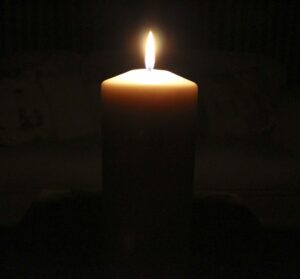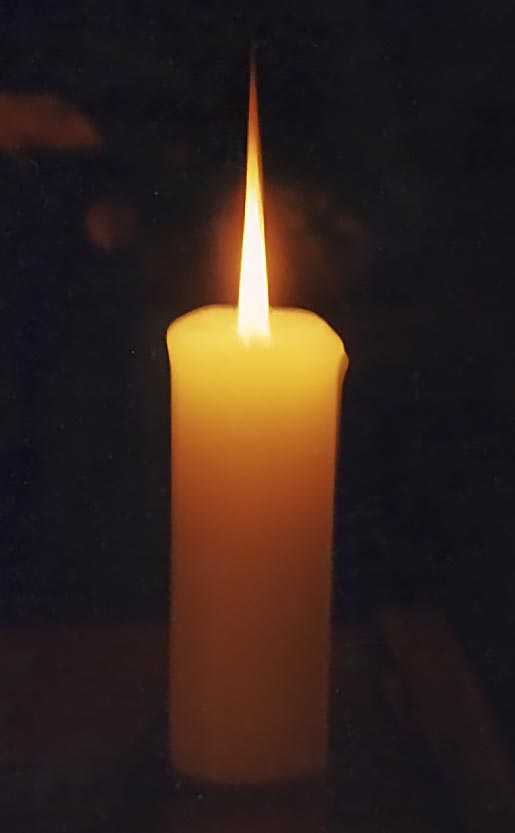
Candlelight
One of the gloomy points in the year has happened again. The clocks went back last Sunday and suddenly nights are darker sooner. I don’t mind winter cold or the rain, snow and wind (well, not too much). After all we can dress to keep warm and dry, but there’s not much we can do about shorter daylight or the grey skies. A report came out yesterday on light pollution; it estimates that 35 percent of man-made light is wasted, unnecessary. I can understand why though; most people share my attitude to the dark
My mother joined the ATS in World War Two and became a driver. At one time she was based near Bromley, working with searchlight batteries in Surrey and Kent. She had vivid memories of driving army lorries on the narrow country roads, with virtually no lights because of the blackout. At night, in mist or fog, she would have the windows down, and a friend on each side of the lorry, standing outside on the running board, hanging on through the open window, with their free arm outstretched to feel for the hedges. That way she could inch forward at walking pace and stay on the road.
The absence of light can be frightening and dangerous. Some historians believe the blackout caused more injury and death from street accidents than it saved from the bombs. Vehicle headlights were covered, leaving just a narrow slit that was almost useless. Towns and villages were completely dark without street lights and the use of torches was prohibited. People would walk into the lightless lamp posts!


The searchlights were huge monsters up to sixty inches in diameter, each with a diesel generator. They had an effective range of over 5 miles and their output was the equivalent of around eight hundred million candles, visible for over 25 miles. Yet for civilians it was forbidden to light a singe candle or even strike a match outdoors at night. Air raid wardens patrolled the streets, looking out for gaps in curtains.
Light can be seen at a far greater distance than it can illuminate to see by. Hence the blackout; allegedly a burning match could be seen by enemy bombers overhead. In Shakespeare’s Merchant of Venice (Act 5 Scene 1), Portia, who has recently saved Antonio from the vengeful Shylock, says: “That light we see is burning in my hall. How far that little candle throws his beams! So shines a good deed in a naughty world.” Ah Yes! A different kind of light, more penetrating than the most powerful searchlight. In my primary school assemblies we used to sing:
Jesus bids us shine with a clear, pure light,
Like a little candle burning in the night;
In this world of darkness, we must shine,
You in your small corner, and I in mine
What a wonderful world if we were all little candles burning in the night. Especially now during the pandemic. A kind word here, a helping hand there. Cheerful encouragement for a neighbour, a card through the post. A conversation in the street. Our little light may have profound consequences. Searchlights were not only used against the enemy. They assisted damaged RAF planes to get home. As the plane limped overhead all the searchlights in that area would first shine vertically up then rotate slowly to the horizontal, all pointing in the direction of the nearest airfield. Without knowing it, we may do the same for fellow travellers in this naughty world. The smallest light banishes dark from the blackest room. Darkness can only exist in the absence of light.
And where do we get our light from? From the source of all light, of course. Jesus said “Therefore, hold up your light that it may shine unto the world. Behold I am the light which ye shall hold up—that which ye have seen me do.” (1 Nephi 18:24)